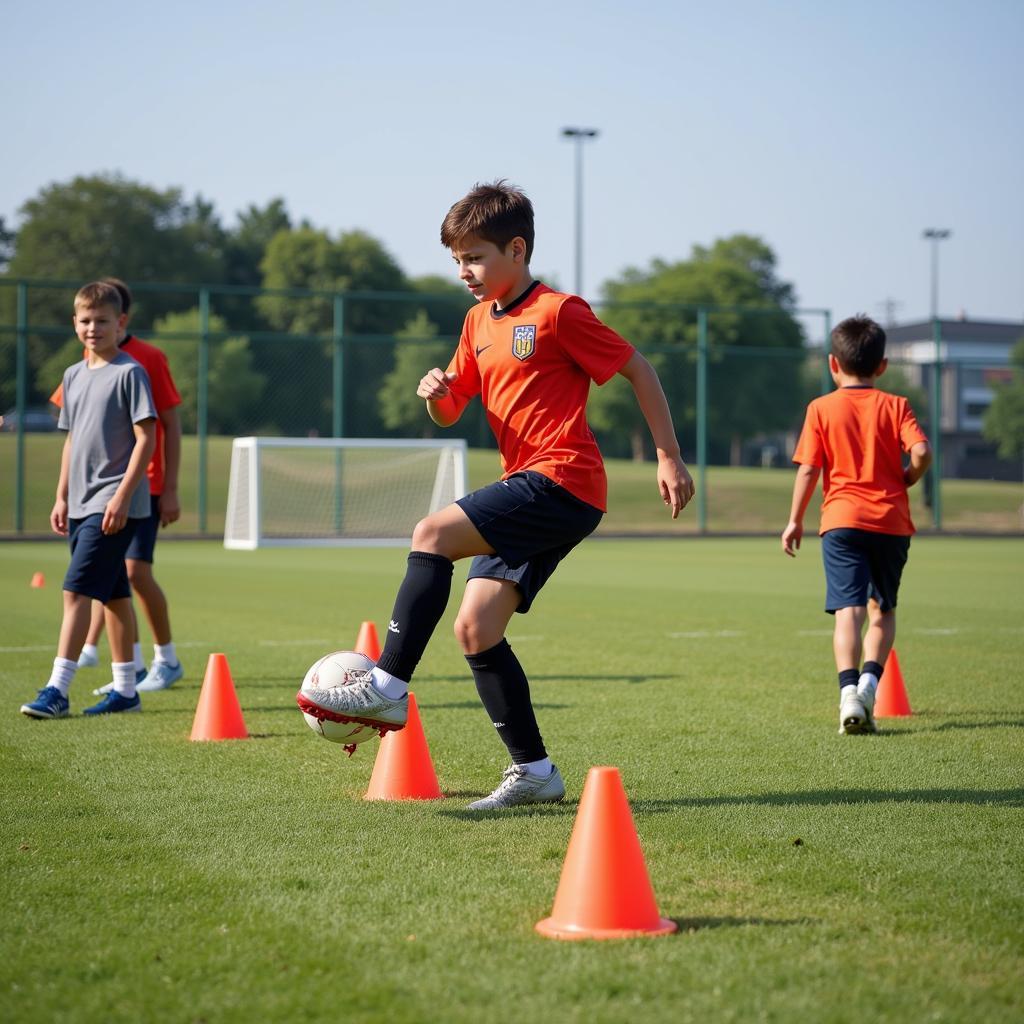Building a Winning Team: A Guide to Developing Young Football Players
October 13, 2024As a professional footballer who thrives on the energy of the game, I’m constantly inspired by the raw talent and potential I see in young athletes. The future of football rests on the shoulders of these aspiring players, and nurturing their development is crucial for creating a new generation of champions.
This comprehensive guide delves into the multifaceted world of young player development, offering insights into building a successful youth football program.
The Foundation of Success: Core Principles for Developing Young Players
Just like constructing a skyscraper requires a solid foundation, developing well-rounded footballers starts with establishing core principles:
- Focus on Fun: At its heart, football is a game. Instilling a love for the sport through enjoyable training sessions and fostering a positive learning environment is paramount.
 Youth Football Team Celebrating a Goal
Youth Football Team Celebrating a Goal - Develop Technical Skills: Building a strong technical base is non-negotiable. Regular practice with a ball, focusing on passing, dribbling, shooting, and ball control, lays the groundwork for future success.
- Encourage Creativity: While technical skills are essential, don’t stifle creativity. Encourage young players to experiment, take risks, and develop their own unique playing style.
- Promote Physical Literacy: Football demands a certain level of athleticism. Incorporate age-appropriate exercises that develop speed, agility, coordination, and strength, ensuring young players are physically prepared for the demands of the game.
 Youth Football Training Drills
Youth Football Training Drills - Instill Tactical Awareness: As players grow, introduce them to basic tactical concepts like positioning, movement, and understanding different formations. Encourage them to analyze the game and make informed decisions on the pitch.
Nurturing Potential: Age-Specific Training Approaches
A one-size-fits-all approach rarely yields optimal results. Tailoring training methods to specific age groups is vital for maximizing development:
Ages 6-10:
- Fun and Games: Keep training sessions engaging and fun, incorporating games and activities that disguise skill development as enjoyable challenges.
- Basic Technique: Introduce fundamental techniques like passing, receiving, and dribbling, focusing on proper form and repetition.
- Small-Sided Games: Implement small-sided games to foster decision-making, teamwork, and creativity within a dynamic environment.
Ages 11-14:
- Increase Intensity: Gradually increase the intensity and complexity of training drills, introducing more advanced techniques and tactical concepts.
- Positional Play: Begin to introduce the nuances of different positions, allowing players to explore roles and develop specific skill sets.
- Competitive Exposure: Provide opportunities for competitive matches, allowing players to test their skills and learn from real-game situations.
Ages 15-18:
- Refine and Specialize: Focus on refining technical skills, tactical understanding, and physical conditioning to prepare players for the demands of higher-level competition.
- Mental Toughness: Incorporate mental training techniques to develop resilience, focus, and the ability to perform under pressure.
- College and Career Guidance: Provide guidance and support for players aspiring to play at the collegiate or professional level, offering resources and advice for pursuing their footballing dreams.
A Holistic Approach: Looking Beyond the Pitch
Developing well-rounded individuals extends beyond football skills:
- Nutrition and Rest: Educate young players on the importance of proper nutrition, hydration, and rest for optimal performance and recovery.
- Character Development: Instill values of sportsmanship, respect, teamwork, and leadership, shaping responsible individuals both on and off the pitch.
- Academic Balance: Emphasize the significance of education, encouraging a healthy balance between academics and athletic pursuits.
Investing in the Future
Developing young footballers is an investment in the future of the sport. By embracing a holistic approach that encompasses technical, tactical, physical, and personal development, we can empower the next generation to reach their full potential and continue to elevate the beautiful game.